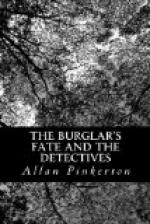information from lack of definite knowledge on which
to base intelligent action. In order that one
of the many of these expedients may be fully understood,
a few words in detail may not be out of place.
As is well known, the mail of an individual is so
sacredly guarded by the laws of the country which
govern the postal service, that an attempt to interfere
with the letters of another is regarded as a felony
and punished with severity. Of course, therefore,
no efforts of ours would be directed to the obtaining
or opening of any letters which might be mailed to
the suspected individual. Our object was simply
to obtain the addresses upon the envelopes, if possible,
and then to search out the parties to whom they had
been consigned. In this instance our manner of
proceeding was quite simple, but it required that it
should be managed with great care and without exciting
the suspicion of any one. For this purpose each
of the operatives, detailed for this duty, was provided
with a number of envelopes of a peculiar size and color,
and all addressed to fictitious persons. Our
plan was, that if any one of Edward’s relatives
deposited a letter in any of the street boxes, the
operative should be on hand and be prepared to drop
his letter into the box immediately on the top of
it. Another operative was then to await the visit
of the postman on his round for collection, when he
would step up to him and making a pretense of a mistake
in the address of a letter which he had mailed, would
from its position be enabled to obtain a glimpse of
the suspected letters below, and their addresses.
This watch was maintained unceasingly for several
days without result, and it appeared either that the
family were unaware of Edwards’ hiding-place,
or else that they were fearful of being watched, and
avoided communicating with him on that account.
In the meantime, William received another visit from
Mr. Silby, the president of the despoiled bank, who
stated very reluctantly, that he and Mr. Welton, the
cashier, during the absence of Eugene Pearson from
the bank, had attempted the feat of loosening the screws
upon the lock of the vault, and had been unable to
do so. They had exerted their strength to the
utmost, and the screws had sturdily resisted their
efforts. He was therefore compelled to admit that
thus far the suspicions against young Pearson appeared
to be well founded, and that the screws had evidently
been loosened before the prisoners were confined in
the vault, in order to allow them to escape, should
the atmosphere prove too oppressive for their safety.
Mr. Silby also stated, that he had obtained an interview
with a Mr. Crampton, the president of the bank at
Independence, where it was learned that the parents
of Newton Edwards resided, and that without divulging
any of our plans regarding that young man, he had
acquired considerable information concerning him.
It was learned that Edwards had for some time been
regarded as a very fast young man, and several episodes
were related of him, in which he had figured in no
very enviable light.




